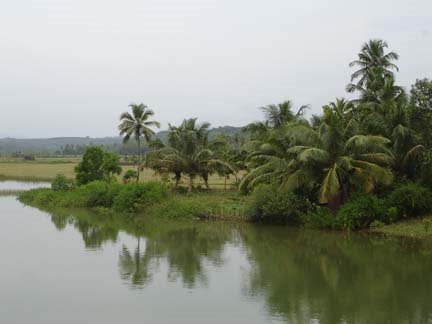We have discussed in the previous post about the Karavali place names in the form of agricultural settlements named after the process of planting seedlings, beginning with prefixes such as Nit-, Nid-, Net- and Ned-. These variants could be suggestive of the trends in the evolution of words during the passage of time.
Apart from the Planting agricultural sites, we also have several place names implying the sites of harvest in the Karavali and also other parts of Southern India. Thus the word 'koi' is not exclusive to Tulu or Kannada but is common for all south Indian Dravidian languages.
Koi tribes
The word “koi” means to cut (the crop)mostly using a sickle. Thus ‘koilu’ means harvest. Check the following place names for suggestion of harvesting sites in the Karavali. However, the word 'Koi' also represents the name of a tribe. Gond tribes were referred to as Koi and Koitur.There is a possibility that the word 'koi' originated from the said tribes.
Koikude: (koi+k+ude). (1)Koi= Gond tribes, ude=place of.Alternately,(2)Koi=to harvest,k=good, ude=place. Koikude is a village with scattered rocky outcrops and agricultural fields in Mangalore Taluk, located between Haleangadi and Kinnigoli.
Viswanath opines that it could be koi+kude, wherein 'kude' possibly represents sickle,used for harvesting.
Koila: (koi+ala). Harvesting (koi) site besides a stream(ala). Koila is a village near Uppinangadi. Another Koila is in Bantval taluk.
There are places with prefix koi- in Kerala and Tamilnadu. For example:
Coimbatore: (koi+ambatta+oor). A divine village of koi tribes or a harvesting village. Amba-tta = divine, (Amba=Mother goddess?). A major industrial city of Tamilnadu.
Koilandi: (Koi+ala+andi). A Taluk headquarters in Kozhikode (Calicut) district of Kerala.
Koyna (Maharastra). koy+na.= A habitation of Koi people.
Reproductive aspects
The 'koyilu' also meant the standing crop ready for harvest. Further 'koyyel' was the extent of crop area (about one tenth of an acre)that can be harvested by a single person in a day.Thus it is clear that even though the verb 'koi' originally means to cut, the derived word 'koyilu' has been applied to the reproductive (harvest) aspects of agricultural crops.This is further evident by the usage of the word 'koyile' for the reproductive parts of women.
It may not be surprising if the word 'kovil'( the temple) current in some of the Dravidian languages,was evolved out of some of these words.
-with Hosabettu Vishwanath
®
Wednesday, August 26, 2009
205. Harvesting Sites
Labels:
Coimbatore,
Gonds,
Koi tribes,
Koikude,
Koila,
Koilandi,
kovil,
koyilu
Subscribe to:
Post Comments (Atom)
Blog Archive
Books for Reference
- A Comparative Study of Tulu Dialects By Dr. Padmanabha Kekunnaya. Govinda Pai Reserach Centre, UDupi. 1994
- Koti Chennaya: Janapadiya Adhyayana. By Dr. Vamana Nandavar. Hemanshu Prakashana ,Mangalore.2001.
- Male kudiyaru. Dr B. A.Viveka Rai and D.Yadupathi Gowda, Mangalore University,1996.
- Mogaveera Samskriti By Venkataraja Punimchattaya. Karnataka Sahitya Academy.1993.
- Mugeraru:Jananga Janapada Adhyayana. By Dr Abhaya Kumar Kaukradi.Kannada & Culture Directorate,Bangalore & Karnataka Tulu Academy, Mangalore,1997.
- Puttubalakeya Pad-danagalu. Ed: Dr B.A.Viveka Rai,Yadupati Gowda and Rajashri, Sri Dharmasthala Manjunatheswara Tulu Peeta. Mangalore University.2004
- Se'erige. Ed:Dr K.Chinnapa Gowda.Madipu Prakashana,Mangalagangotri,2000.
- Studies in Tuluva History and Culture.by Dr P Gururaja Bhat (1975).Milagres College,Kallinapur,Udupi.
- Taulava Sanskriti by Dr.B.A.Viveka Rai, Sahyadri Prakashana,Mysore 1977
- TuLu naaDu-nuDi By Dr.PalthaDi Ramakrishna Achar, Puttur.
- TuLu NighanTu. (Editor in Chief: Dr U.P.Upadhyaya, Govinda Pai Research Centre,Udupi. Six volumes. 1988 to 1997
- Tulu Patero-A Philology & Grammar of Tulu Language by Budhananda Shivalli.2004.Mandira Prakashana Mangalore. p.317. (The book is in Tulu Language using Kannada script)
- TuLunadina ShasanagaLa Sanskritika Adhyayana. By Shaila T. Verma (2002) Jnanodaya Prakashana,Bangalore, p.304.(Kannada)
- Tuluvala Baliyendre. Compiled by N.A.Sheenappa Hegde,Polali,Sri Devi Prakashana,Parkala,1929/1999
* Landscape images *
A Coastal estuary

Holegadde near Honavar,Uttara Kannada dist, Karnataka
Copy? Right - but kindly remember to acknowledge!
" tulu-research.blogspot." ತುಳು ರಿಸರ್ಚ್. ಬ್ಲಾಗ್ಸ್ಪಾಟ್. ಇನ್

Have a nice day !

Hello Mr.Mundkur,
ReplyDeleteI was very happy to discover your site on TuLu language research. I too hail from Dakshina kannada.
I want to have further dialogues with you regarding tuLu script. Could you please send me your email id and phone number to my Id:
vasantha {dot} keshava {at} gmail.com
Hoping to receive your reply.
Vasanth Kaje
Welcome to the blog!
ReplyDeleteYou can contact me at bmravindra(at)gmail(dot)com.